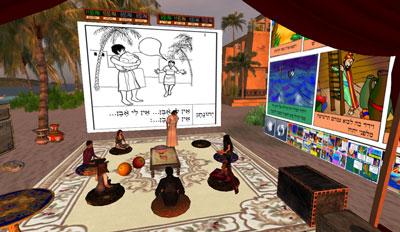Briercrest to offer ancient Hebrew in virtual reality

Charles Grebe, theologian and techno-buff extraordinaire, has found a way to marry his two passions.
This fall, the director of distance learning at Briercrest College and Seminary will teach ancient Hebrew in an online virtual world using an avatar.
He has designed the virtual-world courses to replace classroom courses for students who want to study from a distance. Traditionally, students take distance courses independently—but, Grebe explains, Hebrew III and IV, which are reading courses, don’t work well that way.
Last year, Grebe said, an American woman took Hebrew III and IV by watching recorded videos of the classroom course. But “it was awkward,” he said, because she couldn’t participate. Grebe believes the grammatical and exegetical issues students encounter as they read should be discussed and interacted with in a group setting.
Since then, several other students have contacted Grebe about taking Hebrew III and IV from a distance, which prompted him to look for a more effective approach.
“In language [courses], you need to interact. You need to hear, you need to produce. You need to be able to ask questions and produce answers,” he said.
These virtual-world courses, he said, will simulate, as closely as possible, a live, face-to-face class in which students can interact with each other and Grebe as they learn.
“It should be like you’re in the classroom,” Grebe said. “The virtual world gives us a sense of presence that video doesn’t.”
For Grebe, certain benefits of the virtual-world experience may even outweigh the benefits of a classroom course.
In a virtual world, many students feel more secure because of the perceived distance from their peers and their professor, which allows them to try things they might be too shy to try in a classroom. In language learning, he explained, “You have to make a fool of yourself. You’re back like a child again.”
“There’s also the fun factor,” he added, which he believes is important in something as difficult as learning an ancient language for the first time. “It’s hard enough as it is, so let’s make it enjoyable.”
Grebe plans to conduct the course in a pseudo-Ancient Near Eastern environment, similar to the setting of the Ancient Hebrews, partly because of the “fun factor,” and partly because he believes the cultural component of language learning is extremely important.
Grebe wants to move beyond straight translation, which he said has been the focus of most language learning for centuries. He plans to conduct as much of the course in Hebrew as he can.
Eventually, he said, if the course format continues, he hopes to be able to take students on virtual tours of ancient Jerusalem and the Tabernacle.
He has already added several educational components to his “classroom”: The students will sit on cushions on the ground under a tent to shield them from the sun. There are props like an apple and a stone on the ground so students can say things like, “This is an apple. Here is an stone.”

Charles Grebe. Photo by Rob Schellenberg.
He’s also erected several educational billboards with Hebrew instruction from his personal website, which he designed a few years ago to facilitate more basic Hebrew language learning. He has used the website, Animatedhebrew.com, extensively in teaching Introductory Hebrew I and II.
It features audio/visual lectures, vocabulary and verb flashcards, charts and worksheets, audio recordings from a popular Hebrew textbook, slides and commentary from a trip Grebe took to Israel in 2000, an alphabet song, a Hebrew comic strip featuring the biblical prophet Jonah, and a sketch called “Abbott and Costello Learn Hebrew.” It also introduces the learner to what Grebe calls a communicative approach to Hebrew language learning called Cohelet, which means preacher in Hebrew.
Designing the website was second-nature for Grebe, who holds a Bachelor of Science degree and was a programmer through most of the 90’s.
He pursued his passion for theology later, completing a master’s degree in Old Testament theology in 2007.
The Hebrew teacher has shared the website with students all over North America—for free. He explained that he prefers not to sell content because of his philosophy of education.
“I get all sorts of love letters from students who say I’ve saved them in Hebrew,” he said with an embarrassed laugh.
The virtual-world Hebrew courses will begin this fall, and will be unique in content as well as format: Briercrest College and Seminary is one of only a handful of institutions in Canada to offer Hebrew. Only a handful of those offer second-year (senior) Hebrew, and even fewer schools offer it online.
Interested students may contact Charles Grebe directly with questions about the course content. Students may direct registration inquiries to Shirley Entz. Students must register by September 3.
